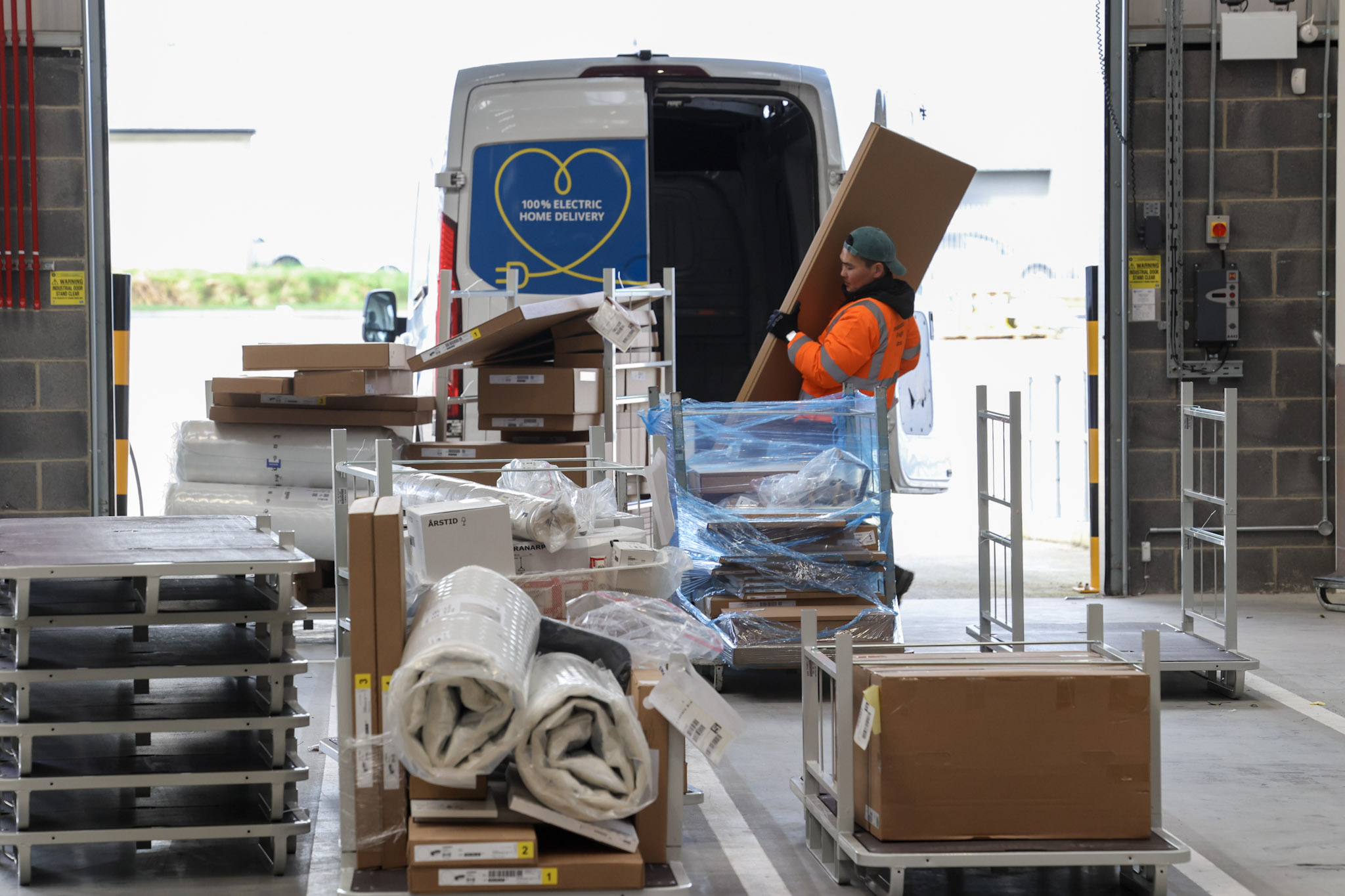In today’s peak trading round-up we report on the expected spike in express orders ahead of Christmas, and on how retailers are adjusting their delivery promises in order to reassure customers – both that they will receive their goods on time, and that delivery will be sustainable.
Trading in the run up to Christmas
Paul Martin, UK head of retail at KPMG, says that Christmas could be a time of make or break for many retailers.
“There is no denying that retailers have had a troublesome few months recently, making the final push towards Christmas all the more vital in determining overall success or failure,” he said. “Indeed, some retailers make the vast majority of their annual profits during these few weeks alone.
“Thankfully the bout of political uncertainty is now seemingly behind us post-election, albeit Brexit is yet to be executed. This may well result in a resurgence of consumer confidence for the time being, which in turn will encourage shoppers to finally make the purchases that they may have been putting off in recent months. In any case, Christmas is usually a time when festivities trump traditional reason, and retailers will be trying to make up for lost ground.
“In the final days before Christmas, shoppers will be focussed on buying last minute gifts and ensuring their cupboards are adequately stocked for the festivities. Alongside the classic gifting categories like health and beauty or fashion, this period will be prime time for the grocery sector to win favour with customers. The competition among the food and drink players is so fierce currently, but customer choice is likely to boil down to quality, price, convenience as well as longstanding loyalties. Christmas trading reports in January will reveal who had the winning combination of these drivers.
“Our high streets will also see some more action too in the coming days, as even online delivery can prove risky against the ticking clock – physical retail still has the advantage of immediate fulfilment. What’s more, with Christmas falling on a Wednesday, shoppers have both a whole weekend and two weekdays to fire through their shopping lists. The key question among the retailers though is; can sales rebound enough to make 2019 profitable in its entirety?”
In-store visits set to peak this Saturday
Ten million panicking shoppers will spend more than £1.4bn on Christmas purchases in-store this Saturday, while online shopping becomes more muted, new estimates suggest.
Data from VoucherCodes.co.ukand the Centre for Retail Research (CRR) suggests that only 4.8m people will be buying online this weekend, with the realisation that gifts might not arrive in time for Christmas. Shoppers will also be heading to the supermarket, to buy Christmas food and drink.
Jimmy New, director of marketing at VoucherCodes.co.uk, said: “With this Saturday being the last one before Christmas, it’s unsurprisingly a very busy shopping day for both retailers and consumers looking to put the finishing touches to their Christmas shopping. Across the country, many retailers will be extending their opening hours on Saturday – so it’s worth checking if you can get in early, or even late in the evening, to avoid the rush.
“Something else to remember, particularly if the thought of manic crowds doesn’t fill you with festive cheer, is that several retailers offer special delivery options on online shopping. Hundreds of brands including the likes of M&S, Next, and House of Fraser can deliver in time for Christmas if you order by Sunday, and a few can even guarantee delivery if you order as late as Monday – so there’s still time to shop online, if you act quickly. It’s also worth having a look at the deals and discounts that many retailers are still offering when you shop online as you can still make sure you get a good deal, even if you fall into the ‘panic shopping’ category.”
Express delivery spikes by almost 7,000% ahead of Christmas
Orders for express delivery from retailers spike by close to 7,000% during the Christmas shopping season, new analysis suggests. This, and a wider increase in the number of parcels sent during November and December, mean that average delivery times lengthen as a result.
The study, from post-purchase communication specialists parcelLab, analysed data from more than 112m parcels sent last Christmas by its retail clients across Europe and found that the number of parcels ordered by customers for express delivery rose by 6,981% compared to the average for the rest of the year.
During November and December, 116% more parcels were sent than was average over the rest of the year. Despatch rates were highest in the electronics, computers and accessories category (+186%), followed by furniture and decorations (+116%), books, toys and office supplies (+96%), and beauty, pharmaceuticals and food (+62%).
As a result, average delivery times rose to 2.1 days during November and December, from 1.9 days between January and October. Successful first-time delivery fell to 94% in December, from 97% during the year. Meanwhile, returns rose last year by 22% during late December and early January 2910.
“With the customer experience now proving to be the true differentiator in terms of encouraging repeat business and loyalty, it’s vital that retailers recognise the huge additional pressure that the festive season puts on order processing and deliveries, so that they can prepare in advance to help maintain their service levels,” said Katharine Biggs, content and marketing manager at parcelLab’s London office.
“The large amount of new customers retailers attract at this time of year means that maintaining and improving the buying experience can help retain them and grow retailers’ revenue bases for the coming year.”
ParcelLab works with more than 350 online and multichannel retailers including Lidl and Eve Sleep.
Retailers reassure customers with longer Christmas delivery times
Retailers are overestimating the time it takes to deliver a product to the end customer in order to avoid disappointing them, a Kurt Salmon study suggests. At the same time, it found, some traders are offering less convenient delivery in order to encourage more sustainable shopping habits.
Kurt Salmon put Christmas delivery promises made by 72 retailers to the test through 112 online orders, placed on Cyber Monday December 2. Each order was for six items for delivery and for click and collect, where offered by the retailer. The study found retailers promising delivery in an average of 5.3 days in 2019 – a third up on the four days promised last year. Despite this, one in four still failed to meet that extended promise.
But while the average delivery time is getting slower, some leading retailers are offering faster delivery times. Amazon Prime, Argos, B&Q, John Lewis, Levi’s and Next all promise delivery within one day, while Amazon (non-Prime), Converse , Pets at Home, Littlewoods and Superdry deliver within two days.
Of the retailers surveyed, most offered the same delivery time whether an item was delivered to home or collected in store. Click and collect services are as fast as same-day at Argos and Halfords, one day at John Lewis and Topshop, and two days at Asda, Lakeland, New Look and Pets at Home, the study found.
At the same time, customers are being asked to spend more for their order to qualify for free delivery. Free delivery is only offered in 2019 when shoppers spend a median of £50. That’s 9% up on the previous year.
Siobhan Gehin, managing director at Kurt Salmon, part of Accenture Strategy, said: “In recent years, retailers have suffered by overpromising during the holiday season, hoping to win out by pledging fast deliveries that they haven’t been able to fulfil. This year we’re seeing more retailers take a cautious approach, preferring to under promise and over deliver. In other words, it seems that many high-street retailers have decided not to try and beat the likes of Amazon in a game of convenience, instead focusing in different areas to win the loyalty of customers.”
Retailers act to balance convenience with sustainability
Delivery is also becoming less convenient as retailers take steps to encourage sustainable buying, the Kurt Salmon study suggests.
Retailers are actively discouraging shoppers from buying online in order to return, both by including better sizing guides on their websites and by not including a packaging or returns slip in their orders. The number of retailers promising free returns fell by 15% compared to 2018.
At the same time, 45% of retailers are using 100% recyclable materials in their packaging. Carphone Warehouse uses electric vehicles for its deliveries, while Hugo Boss, Aldi and Asda use FSC certified cardboard.
Gehin said: “Many British retailers are making a concerted effort to become more sustainable, while at the same time, reducing the operational cost and burden of returns. It’s a delicate balancing act, whereby consumers demand convenience but also have good intentions to consume and purchase more sustainably. Retailers need to balance consumers’ desire for convenience and their aspiration to be sustainable, recognising that small changes, such as introducing recyclable or reusable packaging, can go a long way in building customer loyalty.”
Image: Fotolia









